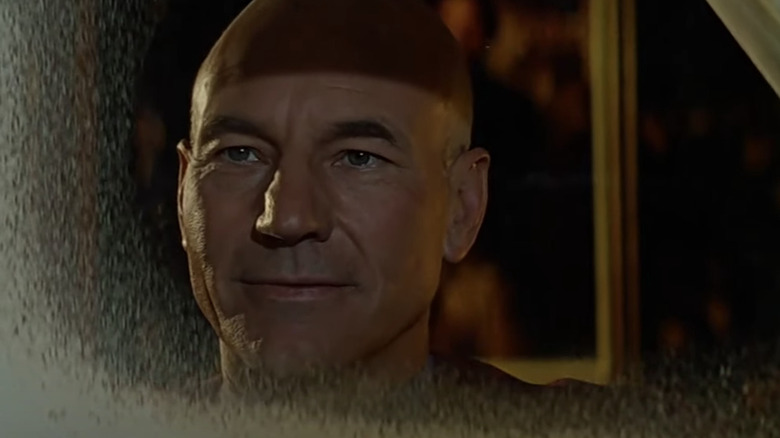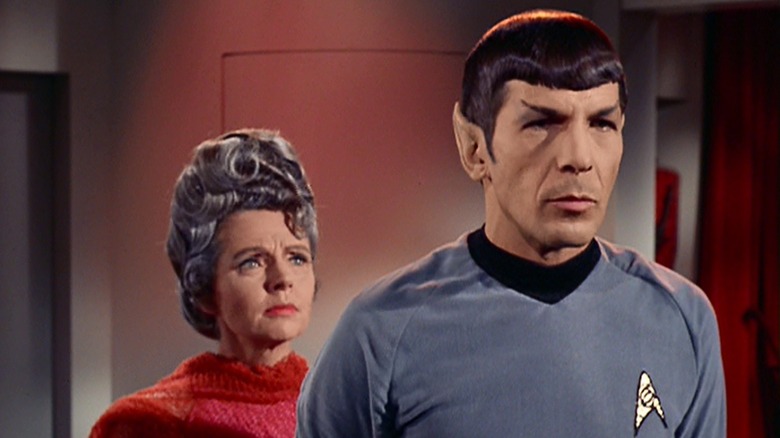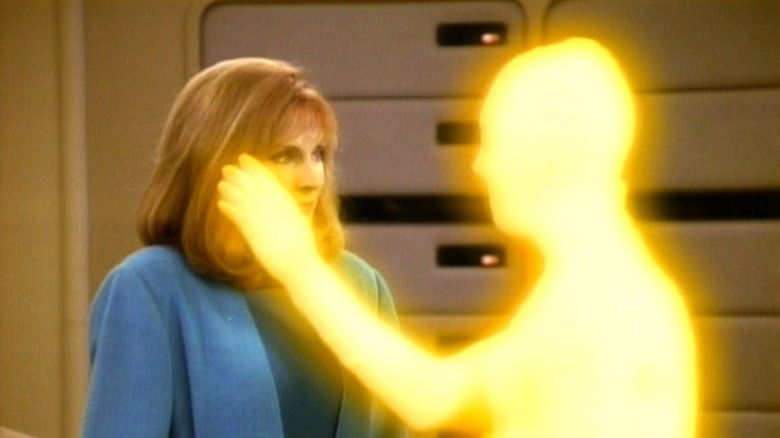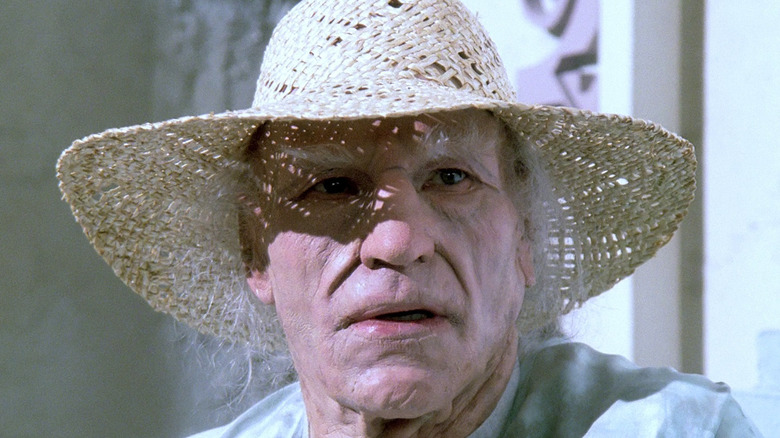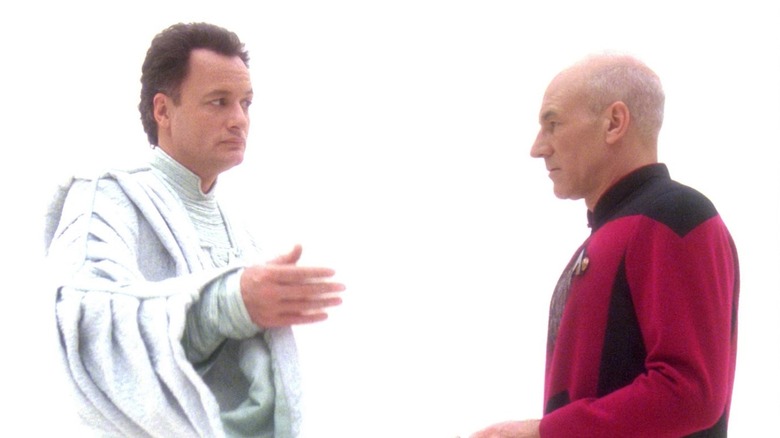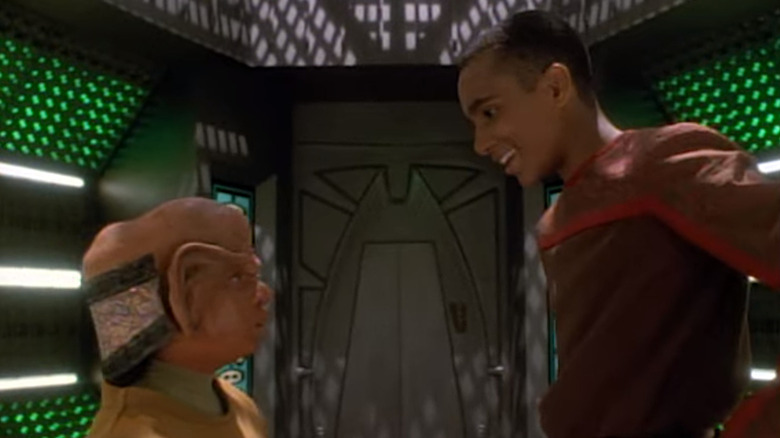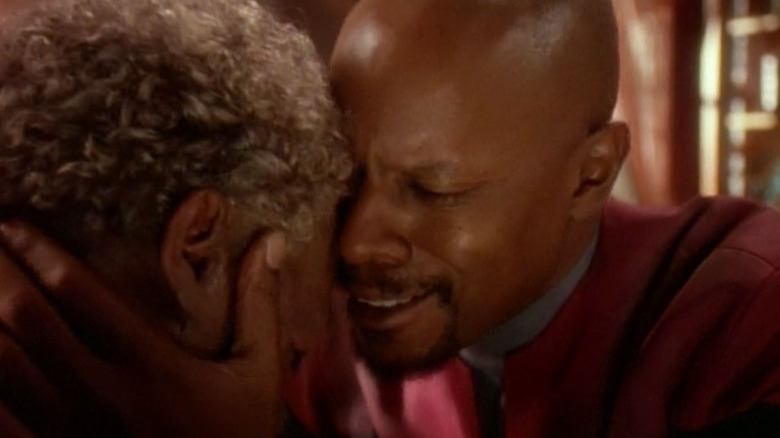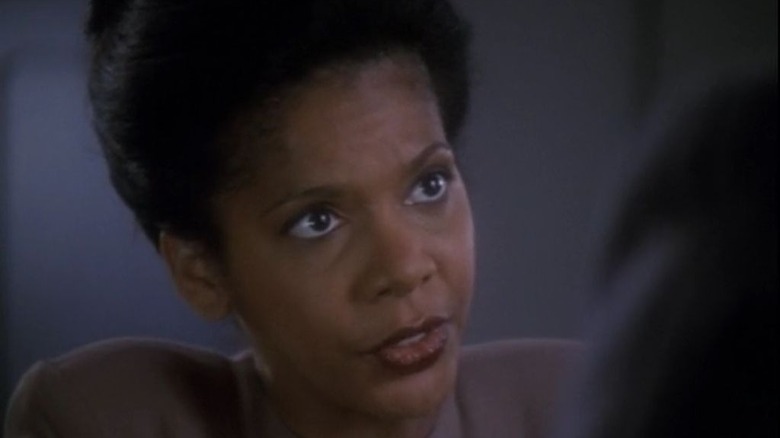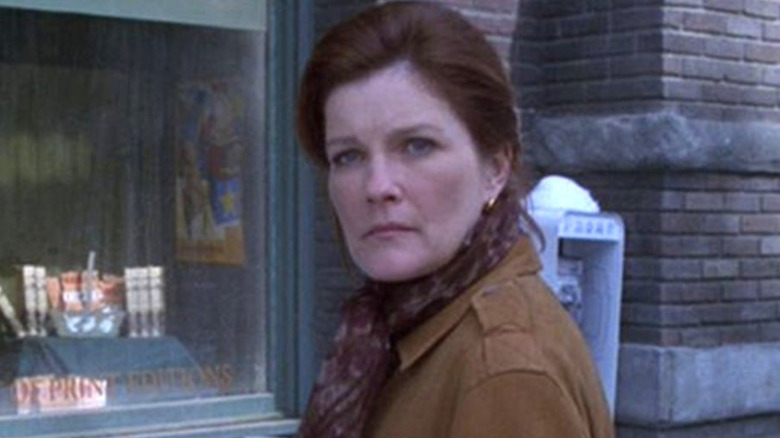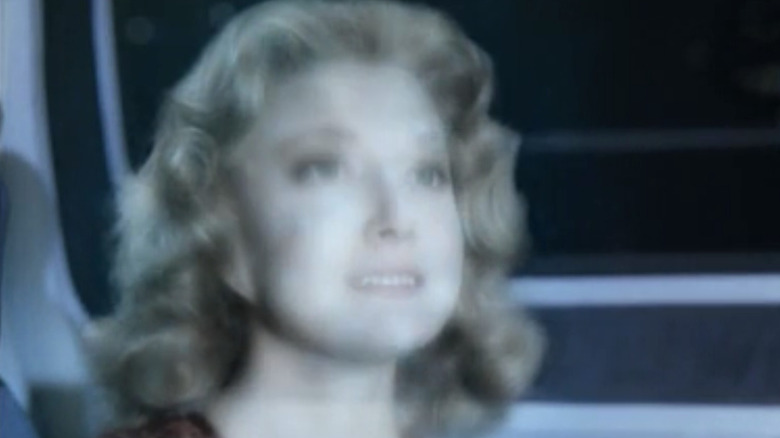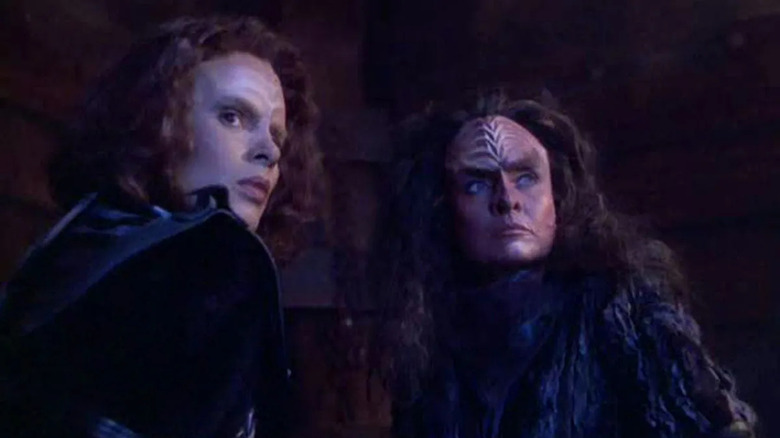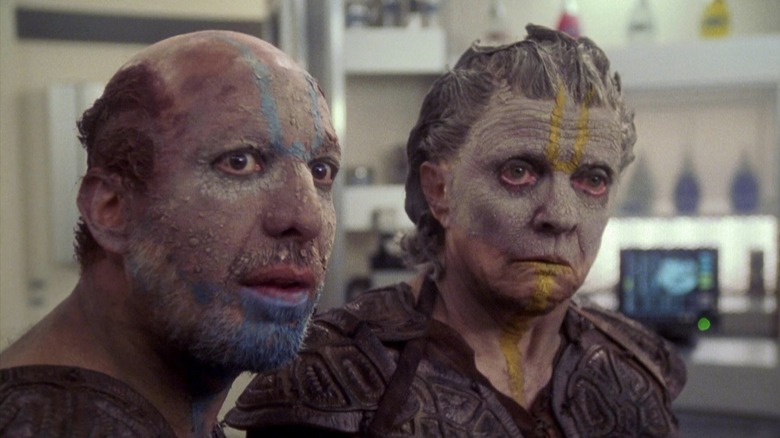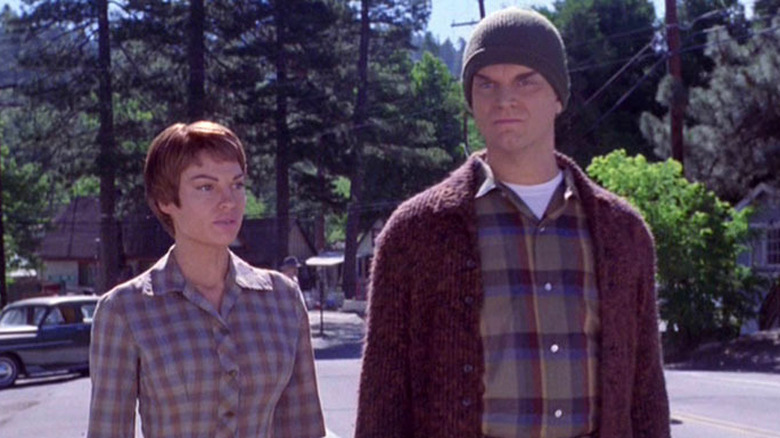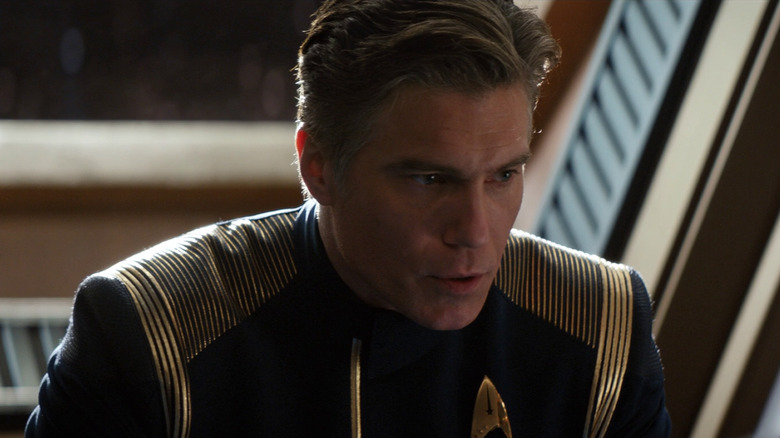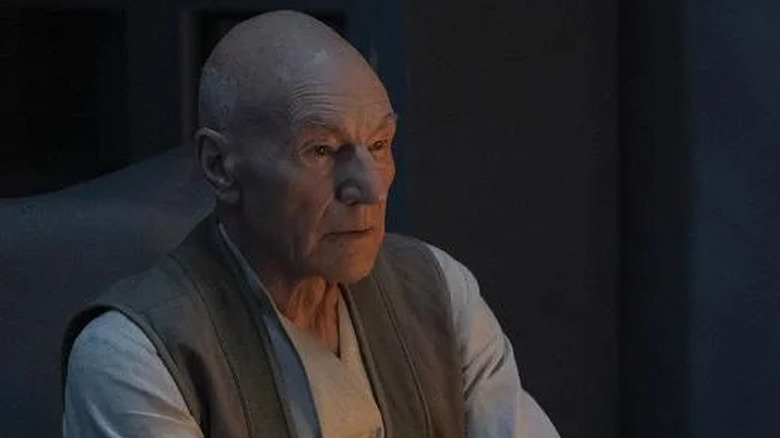14 Star Trek Episodes That Capture The Christmas Spirit
The "Star Trek" franchise has spanned more than fifty years, nine television series, thirteen feature films, and over 800 episodes — but, largely thanks to creator Gene Roddenberry's secular attitudes, has never produced a single Christmas episode. Outside of a few off-hand mentions, Earth religions have never had a big part in the franchise, so you're not going to find an episode where the crew gathers for Christmas dinner or exchanges gifts beneath a lit tree.
But despite never having had a celebratory Christmas episode, the franchise has had plenty of stories that capture the meaning of the holiday just the same. While the show has waded into darker territory and featured stories of all kinds, it's always been at its best projecting hope and positivity. It's the franchise's uplifting, inspirational values that have helped it resonate for more than half a century, with episodes built on messages of hope and love, charity and good deeds, more like the best Christmas stories have to offer than dystopian science fiction.
This Christmas season, rather than compile a list of "Star Trek" episodes that mention the Holy Spirit, Santa Claus, or Ebenezer Scrooge, here are specific episodes from nearly every series that embody the Christmas spirit.
14. Journey to Babel (Star Trek, Season 2, Episode 10)
The Enterprise is on its way to a peace conference on Babel when they stop to pick up an Ambassador — a sagely Vulcan named Sarek — who is revealed to be none other than Spock's own father. Everyone is surprised but Spock, and it soon becomes clear there's bad blood between the father and son. It's the first episode to delve into the heritage of Spock, a man torn between his human and Vulcan sides, never fully welcomed by either culture.
Kirk's peace mission to Babel is derailed when the delegates refuse to get along, seemingly at odds over the admission of the Coridan to the Federation. There have always been tensions between these groups, and Sarek is distrustful of the Tellarites' motives. When the Tellarite ambassador Gav turns up dead, Sarek is implicated in the murder. Sarek however falls suddenly ill, and only the aggrieved Spock can save him.
Amidst this family crisis, there's an assassination attempt on Captain Kirk just as a mysterious ship attacks, and it's clear not all is as it seems. Someone is intent on disrupting the peace conference, and saving Sarek and the Enterprise will require everyone to put aside their distrust and work together. There may not be any tinsel or sleigh bells, but "Journey To Babel" captures the spirit of Christmas with themes of love, family, and charity, and looking past our differences to work together in friendship.
13. Transfigurations (Star Trek TNG, Season 3, Episode 25)
In one of many under-appreciated episodes of "Star Trek: The Next Generation," "Transfigurations" sees the crew take in an alien refugee, a man with amnesia they call John Doe, who seems to be in some sort of danger and is exhibiting strange abilities. He can heal others with a touch, and his mere presence seems to bring joy and happiness to everyone around him.
But an alien ship comes looking for him, calling him a dangerous escaped criminal, and demands his return — for an execution. The crew of the Enterprise, including Dr. Crusher (who has fallen in love with him), can't reconcile that description with the man they've come to know. He saved Worf's life, helped Geordi become a happier, more confident version of himself, and has done nothing but bring positivity and good spirits to the Enterprise. In the end we learn that his race is slowly undergoing an evolution into a new form of life, one that carries with it incredible insight and enlightenment. John Doe's people fear those who have undergone this change, and want them eliminated.
It certainly isn't mentioned among anybody's rankings of the best "Star Trek" stories, but "Transfigurations" is a strong episode nonetheless, one that deserves recognition. It deals with themes of rebirth, and the power of love and light, making it perhaps the truest expression of the Christmas spirit in "Trek" history.
12. The Inner Light (Star Trek TNG, Season 5, Episode 25)
Frequently cited as one of the best "Star Trek" episodes ever, "The Inner Light" tells a heartwarming family tale that begins with the Enterprise encountering a strange alien probe. Struck by a beam of energy from the craft, Picard is knocked unconscious, and wakes up on a strange planet in a new life. His name is Kamen, he is married and living on a far-off planet called Kataan — one he soon learns is slowly dying of some form of climate change.
Over the course of the story Picard lives an entire lifetime on Kataan as Kamen, fathering three children (even grandchildren), all the while trying to help his community find a solution to the planet's climate woes. He loses his best friend to illness, watches his wife die by his side as the planet withers, and he knows his grandchildren may not have a community left as they get older. But he learns the government is preparing a latch-ditch effort to save their species, a space-faring probe that will carry with it a sophisticated technology allowing others to experience life on their world.
When Picard wakes up, he struggles to remember he is Jean-Luc Picard, having just lived an entire lifetime in an instant. He was person their probe found, and he alone is left to carry the memory of their people. "The Inner Light" is a celebrated story with an important lesson at its core: Treasure those you love, because you never know when they might not be there anymore.
11. Tapestry (Star Trek TNG, Season 6, Episode 15)
Best described as a "Star Trek" version of "A Christmas Carol," Picard dies at the start of "Tapestry," only to be met by Q in the apparent afterlife. But he's not here to usher the captain to heaven, instead offering Picard the chance to change his past. Finding himself back in his early Starfleet days, he's aboard a space station with two fellow graduates, awaiting their first assignments. It's a period when Picard was more arrogant and reckless, and he's here to avoid a confrontation that would get him impaled through the back.
But while attempting to chart a more responsible course for himself, he becomes romantically linked with a young cadet he'd regretted never pursuing. Trying to play the role of mature, responsible officer, Picard succeeds in alienating his best friend. Having made the changes he wanted, Q snaps him back to the present, where he's no longer dead — and no longer Captain Picard — but a low level crewman aboard the Enterprise. Picard now realizes that the mistakes he made in his youth helped him become the man he was.
Putting aside an uncomfortable scene where 52-year-old Patrick Stewart gets physical with the 18-year old actress playing his old flame, it's one of the series' best installments — a story of life, love, and regret where every moment is shown to be precious.
10. In The Cards (Deep Space Nine, Season 5, Episode 25)
Perhaps the closest "Deep Space Nine" ever came to a Christmas special, "In the Cards" presented Jake Sisko, who was looking to cheer up his father when he noticed the war taking its toll on the Captain.
The Dominion War, of course, hasn't been good for anyone on the station. But Jake thinks by helping his father it will help everyone, since the elder Sisko is both the station's commander and the Emissary of the Prophets. When an auction at Quark's bar reveals a vintage 20th century baseball card for sale, Jake sets out to acquire it as a gift, but it falls into the possession of a mysterious visitor instead.
The visitor turns out to be a scientist studying the nature of death, demanding a collection of strange items in exchange for the card — items needed to complete his latest experiment. To acquire what he's asking for, Jake — aided by his friend Nog — must do a series of favors for a number of people on the station. In getting the card for his father, they end up lifting the spirits of everyone involved, including the Federation's most vile enemies. In the middle of the Dominion War, "In the Cards" proves to be an uplifting, inspiring series entry that shows not just the importance of family, but of how far one charitable deed can go, and the effect a little joy can have on people.
9. The Visitor (Deep Space Nine, Season 4, Episode 2)
Along with "The Inner Light," the "Deep Space Nine" episode "The Visitor" is often voted among the best — or at least the most powerful — episodes of the franchise, and for good reason. Its message of love and family will speak to anyone with a parent or child in their life.
"The Visitor" sees the apparent death of Captain Sisko in the episode's opening scene, when after a crisis aboard the Defiant he is attempting to syphon energy from the warp core. This devastating loss happens right before the eyes of his teenage son Jake.
The younger Sisko struggles to deal with his father's death, falling into a deep depression. One night, however, Jake is thrown for a loop when his father materializes in front him, lost and confused by what has happened. But just as soon as he appears, he vanishes again.
The crew soon discover that Captain Sisko isn't dead, but lost in a layer of space that sees him reappear during a rare cosmic cycle, and it is tied to the presence of his son. Over the next sixty years, Jake Sisko abandons his wife and career and devotes his entire life to bringing his father back. It all ends with time being reset, and the father and son getting a fresh start. But "The Visitor" is more than a mind-bending time travel tale — it's a story of family, of second chances, and how the bond between loved ones cannot be bound by space or time.
8. The Sound of Her Voice (Deep Space Nine, Season 6, Episode 25)
Perhaps overshadowed by the season finale that followed it, "The Sound of Her Voice" dealt with the effects the war was taking on the station's crew. A distress call from the U.S.S. Olympia reveals that its captain, Lisa Cusak, is the sole survivor of an accident that left her stranded on an inhospitable planet. Her situation is dire, her food and medical rations running low, and the Defiant is days away at maximum warp. Sisko immediately changes course, but the clock is ticking as Cusak is suffering from a rapidly deteriorating illness.
The crew takes turns over the next three days keeping the stranded officer company over subspace radio, and their discussions become therapy sessions, with Captain Cusak helping them understand the heavy toll the war is taking on them. Emphasizing that the burden need not be shouldered alone, and to hold on to dear friendships in times of need, the Defiant's crew take her words to heart.
As the crew adopts this newfound vow not to let the war pull them apart, and to cherish their time together, it becomes especially poignant given that the series was entering its final season. Though the episode would conclude on a more somber note than most on this list (including a twist ending), it leaves the audience with a message of love and hope, of family and friendship that resonates more loudly during the Christmas season.
7. 11:59 (Voyager, Season 5, Episode 22)
Take away the opening and closing scenes set aboard Voyager and you might mistake this one for a genuine Hallmark Christmas special. Essentially one long flashback, the episode has Janeway telling the story of her ancestor Shannon O'Donnel, who reportedly helped build a historic Earth monument more than 300 years prior (at the dawn of the 21st century), something the Captain takes great family pride in.
Flashback to just after Christmas in the year 2000 when we meet Henry Janeway, a disgruntled book shop owner refusing to sell his store and home to a corporate bigwig who wants to build a massive "self-sustaining civic environment" that Janeway sees as little more than a glorified shopping mall. Along comes a stranger — Shannon O'Donnel — a down-on-her-luck passerby who Janeway gives accommodations. Over the course of the story, O'Donnel is determined to convince Janeway there is value in selling his home, and that this "Millennium Gate" may be for the best interests of the community. Along the way, Shannon and Henry fall in love, and the rest is history.
As the episode closes, Captain Janeway realizes that family stories through the years have exaggerated O'Donnel's role in the project, but she takes pride nonetheless. It's a holiday story of love, heritage, starting over, and accepting people for who they are rather than what we may want them to be. If it hadn't been an episode of "Star Trek," it just might have become a '90s TV Christmas classic.
6. The Gift (Voyager, Season 4, Episode 2)
Following on the heels of "Scorpion," Borg drone Seven of Nine is left aboard Voyager. Isolated from the hive mind but still brainwashed by the Borg and uninterested in what Voyager has to offer, Seven demands to be returned to the collective. Janeway is unwilling to give up on the lost soul Seven, but just when they think they've found a way to bring back her humanity, her cybernetic implants start killing her. With little knowledge of Borg physiology, The Doctor is at a loss, and unless the problem is corrected, they may lose their newest friend.
Elsewhere, Kes is undergoing a strange and sudden biological change, with her telepathic abilities becoming more and more powerful. With Seven in danger, it's Kes who uses her new and improved insight and telekinesis to locate the problem and correct the fault in her implants, saving the ex-Borg. But when Kes's telepathic powers get out of control, she begins posing a danger to the entire ship, and realizes her time on Voyager is coming to an end.
Undergoing a remarkable transformation, Kes leaves the ship — and the series. But out of gratitude for having welcomed her into their family and guiding her to adulthood, she gives Voyager one final gift, using her newfound power to catapult Voyager ten years closer to home. Touching on themes of gratitude, charity, and faith, "The Gift" also teaches us never to give up on those in need.
5. Barge Of The Dead (Voyager, Season 6, Episode 3)
You might not expect an episode titled "Barge of The Dead" to be an uplifting one, but it's as close to a Klingon Kristmas Special as you will get on "Star Trek," as the ship's resident half-Klingon struggles with matters of faith and family. In the episode, Torres (who has always resented her Klingon side) begins to have visions of the Klingon Barge of The Dead, a mythical vessel said to ferry the souls of dishonored Klingons to the netherworld Gre'thor. But aboard the barge she meets her mother Miral, on her way to Klingon hell ... and it's her fault.
According to the barge's captain Kortar, Miral's dishonor came from her daughter's rejection of the Klingon faith; to save her, B'elanna must finally embrace her heritage. Realizing that to save her mother, she herself may have to go Gre'thor in Miral's place, she at first tries to use Voyager's technology to cheat fate and save her mother. Kortar sees through her ruse, but Miral helps her understand the real solution: live as an honorable Klingon, believe and have faith. When she reawakens on Voyager, B'elanna is left to wonder if it was all a dream, or perhaps something more? In the end it doesn't matter, it's her belief that means the most.
4. Terra Nova (Star Trek: Enterprise, Season 1, Episode 6)
A fascinating tale of family and acceptance begins with Archer and the Enterprise visiting a lost colony called Terra Nova, settled by humans almost 75 years earlier, but which lost contact with Earth shortly after its founding.
Here to solve the mystery of what happened to them, the crew finds no trace of the colonists, but instead encounter a violent, primitive race of subterranean aliens ready to kill them on sight. These barbarians believe Archer and his crew are the same people who "gutted" their people once before.
But Enterprise learns that these "aliens" are no aliens at all, but descendants of the original Novan colonists, whose settlement fled underground after a meteor strike. When radiation poisoning killed all of the adults, only the youngest children were left to fend for themselves. Archer tries to convince them they are the same race, but the Novans are steadfast in their hatred of humans and refusal to make peace. After helping cure one of the Novans of cancer aboard the ship, trust slowly develops, and Archer wants to return them to Earth to start over.
But the Novans have no interest in going, and so the crew must find a way to help without destroying their newfound culture. Archer must accept that the Novans may be part of the great human family, but they have found their own path that they must walk alone.
3. Carbon Creek (Star Trek: Enterprise, Season 2, Episode 2)
"Carbon Creek" touches on themes of understanding, tolerance, acceptance and keeping an open mind to those who are different. Recalling the "Voyager" episode "11:59," we're once again taken into the past with a series star playing their own ancestor, this time Jolene Blalock as T'Mir, the great-grandmother to T'Pol. The year is 1957, and T'Mir is aboard a Vulcan survey ship when they detect Earth's first artificial satellite. Investigating this new human space technology, they divert to Earth, crash landing in Carbon Creek, Pennsylvania.
Realizing their wait for rescue may be long, the Vulcans make a life for themselves in the rural town. While T'Mir wants the team to keep their distance from humans (harshly judging them for their backwards ways), officer Mestral grows a fondness for the people he meets — fascinated by their world, even forming friendships with them (much to T'Mir's dismay).
But T'Mir doesn't understand Earthlings, and is skeptical of human nature and the vast differences between their cultures. She eventually does form a bond with a local boy struggling to get into college, and leaves him a parting gift before her return to Vulcan. In the end, however, it's Mestral who gets the happy ending, as his affection for humanity causes him to remain on Earth, building a new life in Carbon Creek.
2. New Eden (Star Trek: Discovery, Season 2, Episode 2)
This episode has Burnham wrestling with her vision of an angel, as Stamets grapples with his own visions of his dead husband. Meanwhile, on the search for a mysterious signal, the U.S.S. Discovery — under command of the Enterprise's Captain Pike — investigates a world known as New Eden.
This far-off planet on the other side of the galaxy is inhabited by humans who were mysteriously transported there by an angelic being some 200 years before. Their society has evolved independent of Earth, Starfleet, and the Federation, and they have created a mono-theistic belief system that appears to be a homogenized blending of all Earth's religions.
One of the few episodes to directly confront issues of religion, "New Eden" explores faith, tolerance, acceptance, and rebirth, and even touches on matters of family as Burnham reconnects with her estranged foster brother Spock. While the season-long mystery of the Red Angel would have no ties to Earthly theology, its visual symbolism and role in "New Eden" is rife with religious significance that's given more meaning at the holiday season.
1. Et in Arcadia Ego (Star Trek: Picard, Season 1, Episode 10)
Though it might be hard to watch as a standalone episode, given the single-story nature of "Star Trek: Picard," this double-length final episode of the show's first season saw a bitter sweet end to the story, as Picard fought to save a colony of artificial life forms from extinction at the hands of the Romulans.
Over the first half of the series, audiences saw how Federation and Starfleet had lost their way, and Picard had come out of retirement to try to set things right. In the finale, the former captain of the Enterprise risks everything to save the wayward androids, getting a little help from Starfleet (and his former first officer) along the way.
In another bittersweet but inspirational ending, we say a final goodbye to a beloved member of the "Star Trek" family in what ranks among the franchise's most touching, emotional moments. At the same time, we see the renewed spirit of Jean-Luc Picard — both literally and figuratively — and see the Federation returned to its former glory as protectors of the less fortunate. While the debut season of "Star Trek: Picard" had its flaws, this episode established that it is ultimately a tale about beginnings and endings, life, death, and rebirth, with messages of charity and selflessness — and what's more Christmas than that?
